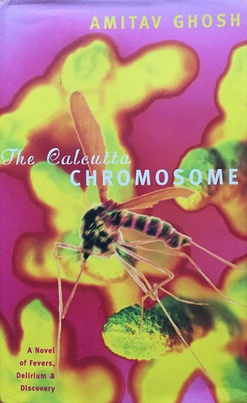The Calcutta Chromosome is a 1995 English-language novel by Indian author Amitav Ghosh.
Ghosh employs a factual background for the invented events in the novel (in a manner akin to Umberto Eco's "Foucault's Pendulum" and several novels by Arturo Perez-Reverte), drawing upon the life and times of Sir Ronald Ross, the Nobel Prize-winning scientist who achieved a breakthrough in malaria research in 1898.
The plot is disorienting, switching between different places and times, and focusing on various characters as the main role. The title is a reference to the supposed ability of the Plasmodium parasite, which causes malaria, to absorb human DNA and then transmit it later into another person, thereby transferring at least some of the memories and traits of the original host and thus achieving a sort of immortality.
